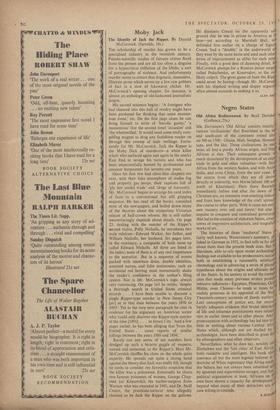Moby Jack
The Identity of Jack the Ripper. By Donald McCormick. (Jarrolds, 18s.)
THE scholarship of murder has grown to be a specialised industry in the twentieth century. Pseudo-scientific studies of famous crimes flood from the presses and are all too often a disguise for a hypocritical titillation of the libido, a sort of pornography of violence. And unfortunately murder seems to attract that dogmatic, insensitive, illiterate prose which serves up a few raw gobbets of fact in a stew of lukewarm clichés. Mr. McCormick's opening chapter, for instance, is almost an anthology of old-fashioned journalistic jargon.
His second sentence begins : 'A foreigner who had chanced into this hall of revelry might have been pardoned for thinking that some momen- tous event,' etc. On the first page alone he can bring himself to write of 'bucolic gaiety,' 'a momentous' (for the second time) 'occasion' and `the wherewithal.' It would need some really com- pelling magnet to drag any fastidious reader on through this swamp of stale verbiage. Fortu- nately for Mr. McCormick, Jack the Ripper is the Moby Dick of murderers—a white killer whale who surfaced again and again in the murky East End to savage his victims and who has been unsuccessfully hunted by professional and amateur harpooners for seventy-one years.
Once his first few bad silent-film chapters are over, with their fake atmosphere of studio fog and property gas lamps, their captions full of `ply her sordid trade' and 'dregs of humanity,' Mr. McCormick begins to arrange his card index of facts in a conventional but still gripping sequence. He has read all the books, consulted most of the newspapers, and boiled down many of the theories about the mysterious Victorian mincer of half-crown whores. He is still rather unconvincingly slapdash about details. On page 23, dealing with the murder of the Ripper's second victim, Polly Nicholls, he introduces two male relatives—Edward Walker, her father, and William Nicholls, her husband. Six pages later, in the mortuary, a composite of both turns up called Edward Nicholls. All three are listed in the index; none of them is of any real importance to the narrative. But in a sequence of events packed with uncertain dates, double identities, assumed names, and false testimonies, such an accidental red herring must momentarily shake the reader's confidence in the author's filing system. Nor is Mr. McCormick's logic always very convincing. On page 163 he writes, 'despite a thorough search in United States criminal records . . . I have been unable to discover a single Ripper-type murder in New Jersey City [sic] or in that state between the years 1890 to 1893.' Yet in the very next paragraph he cites in evidence for his argument an American writer who 'could only discover one Ripper-style murder at the time [1891j . . . in Jersey City.' And a few pages earlier, he has been alleging that 'from the United States . . . came reports of similar killings between the years 1886 and 1894.'
Rarely can any series of sex murders have dredged up such a bizarre gaggle of suspects, named and unnamed, as the Ripper's. Here Mr. McCormick shuffles his clues on the whole quite expertly. He spreads out quite a strong hand against the theory that Jack was really Jill, though he omits to consider my favourite suspicion that the killer was a policeman. Eventually he clears two famous poisoners of women, George Chap- man Ord Klosowski), the barber-surgeon from Warsaw who was executed in 1903, and Dr. Neill Cream, the prostitute-torturer who allegedly claimed to be Jack the Ripper on the gallows. He dismisses Cream on the apparently sot ground that he was in prison in America at t time—yet according to Marshall Hall, w defended him earlier on a charge of bigani Cream 'had a "double" in the underworld a they went by the same name and used each other terms of imprisonment as alibis for each other Finally, with a good deal of damning detail, M McCormick plumps for a Russian junior surge called Pedachenko, or Konovalov, as the likely culprit. The great game of hunt the Riot' could never be boring—though Mr. McCortni. with his slipshod writing and sloppy argunit often almost succeeds in making it so.
ALAN






































 Previous page
Previous page